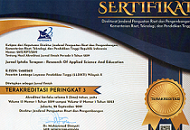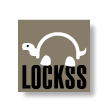PENYUSUNAN INDEKS PSIKOMETRIK KEWIRAUSAHAAN PERBANDINGAN MAHASISWA INDONESIA DAN MALAYSIA
Isteti binti Murni(1*), noviarti binti noviarti(2)
(1) Sekolah Tinggi Manajemen Informatika dan Komputer Indonesia Padang
(2)
(*) Corresponding Author
Abstract
This research aims to analyze an instrument to measure the entrepreneurship index to compare between the two countries among the students have entrepreneurial potential. Based on Entrepreneurship index (NorAishah 2007) version of the instrument was translated into Indonesian language. These same instrument with two different languages was tested in both countries to determine if the items’reliability will have almost similar scores. The number of samples for both countries were more than 262 students. The results showed that the total Cronbach Alpha values were almost the same for both countries after dropping some items with less than 0.5 Cronbach Alpha values. For example, the Cronbach Alpha values for the Malaysian version were the attitude (0.882), entrepreneurial thinking (0.962) and entrepreneurial behavior (0.785). The Cronbach Alpha values for the Indonesion version were the attitude (0.785), entrepreneurial thinking (0.620) and entrepreneurial behavior (0.910). In comparison, the Malaysian version scored a little bit higher than her counterpart in Indonesia. However, on administering the instrument in its own language in the two countries on their undergraduates found that the Indonesian students scored higher for all of the three components. This result could explain for the cultural reasons of the higher scores in terms of Indonesian students’ attitude, thinking and behavior than the Malaysian students. Â
Full Text:
References
Daftar Pustaka
Aiken, L. R. 2002. Attitudes and Related Psychosocial Constructs: Theories, Assessment, and Research. Thousand Oaks: Sage Publications, Inc.
Ajzen, 1. 1991. The theory of planned behaviour. Organizational Behaviour and Human Decision Process 50: 179-211.
Amabile, T.M 1989. Personality process and individual differences. Journal of personality and social psychology. Vol 45. No 2. 357-376
Bird, B. J. 1989. Entrepreneurial Behavior. Glenview, Illinois: Scott, Foresman and Company.
Bird, B., & Schjoedt, L. 2009. Entrepreneurial behavior : Its nature, scope, recent research, and agenda for future research. In A.L. Carsrud & M.Brannback(Eds), Understanding the entrepreneurial mind (pp.327-358), New York: Springer.
Beyer, B.K. 1988. Developing a thinking skills program. Allyn & Bacon. Boston.
Fishbein, M., & Ajzen, I. 1975. Brief Attitude, Intention and Behavior: An Introduction To Theory And Research. Reading, MA: Addison-Wesley.
Isteti Murni. 2012. Pemikiran dan tingkah laku keusahawanan dalam mengenal peluang perniagaan dalam kalangan pelajar IPT di Padang Sumatera Barat Indonesia. Disertasi Phd Universiti Kebangsaan Malaysia.
Kementerian Pendidikan Malaysia. 2001. Pembangunan Pendidikan 2001-2010 Perancangan bersepadu penjana kecemerlangan pendidikan.
Kintzer, F. C. 1996. Entrepreneurship in higher education: a critical balance: University of California at Los Angeles.
Kuratko, D. F. 2005. The emergence of entrepreneurship education: Development, trends and challenge. Entrepreneurship: Theory & Practice. 29(5): 577-597.
Kopertis Zone X. 2009. Final Report young entrepreneur development in West Sumatra, Riau, Jambi and Kepri.
Kamus Dewan. 2005. Ed. ke-4. Kuala Lumpur: Dewan Bahasa dan Pustaka.
McMullan, E., Chrisman, J. J., & Vesper, K. 2001. Some problems in using subjective measures of effectiveness to evaluate entrepreneurial assistance programs. Entrepreneurship Training & Practice (Fall): 37-54.
Minniti, M., & Bygrave, W. 2001. A dynamic model of entrepreneurial learning. Entrepreneurship: Theory & Practice. 25(3): 5-17.
Ministry of Education. 2000. Malaysian New Secondary School Curriculum. Center for Curriculum Development Department.
Mitchell, R. K., Bailey, A., & Mitchell, J. R. 2008. Entrepreneurship, thinking, and economic self-reliance. ESR Review. 10(1): 8-13.
Nor Aishah Buang. 2007. Draf Instrumen Psikometrik Indeks Keusahawanan Nor Aishah (PIKEN). Fakulti Pendidikan Universiti Kebangsaan Malaysia.
Nor Aishah Buang. 2010. Pendidikan Keusahawanan. University Kebangsaan Malaysia 43600 Bangi Selangor Darul Ehsan.
Nor Aishah Buang, Ismail Hj Raduan & Mohamad Husin. 2010. Kajian impak program pembudayaan keusahawanan Insken (2006-2009). Institut Keusahawanan Negara Kementerian Perdagangan antara bangsa dan Industri.
Roth, E. J. 2001. Constructing an entrepreneur: Learning entrepreneurial thinking skill for 24 high school senior. Tesis Ph.D. University of California.
Sexton, D. L. & Bowman, N. B. 1984. Personality inventory for potential entrepreneurs: Evaluation of a modified JPI/PRF-E test instrument. Dlm. Hornaday, J. A. et al. Frontiers of Entrepreneurship Research. Wellesley Mass: Babson College.
Vesper, K. 1993. Entrepreneurships Education. Los Angeles: Los Angeles Centre for Entrepreneurial Studies, University of California
Wyckham, G. R. 1990. Assessing the impact of entrepreneurial education: Canada and Latin America Study for Canadian Federation of Deans of Management and Administrative Studies and Consejo Latinamericano de Escoles de Administracion. British Columbia.
Refbacks
- There are currently no refbacks.
Copyright (c) 2016 Jurnal Ipteks Terapan
Online ISSN : 2460-5611 | Print ISSN : 1979-9292
Publish by LLDIKTI Wilayah X (Sumatera Barat, Riau, Jambi dan Kepulauan Riau)
Jl. Khatib Sulaiman No 1 Kota Padang. Kode Pos 25144. Telp 0751-7056737. Fax 0751-7056737. Website:http://www.kopertis10.or.id
This work is licensed under a Creative Commons Attribution 4.0 International License.








.png)






_(1).jpg)



